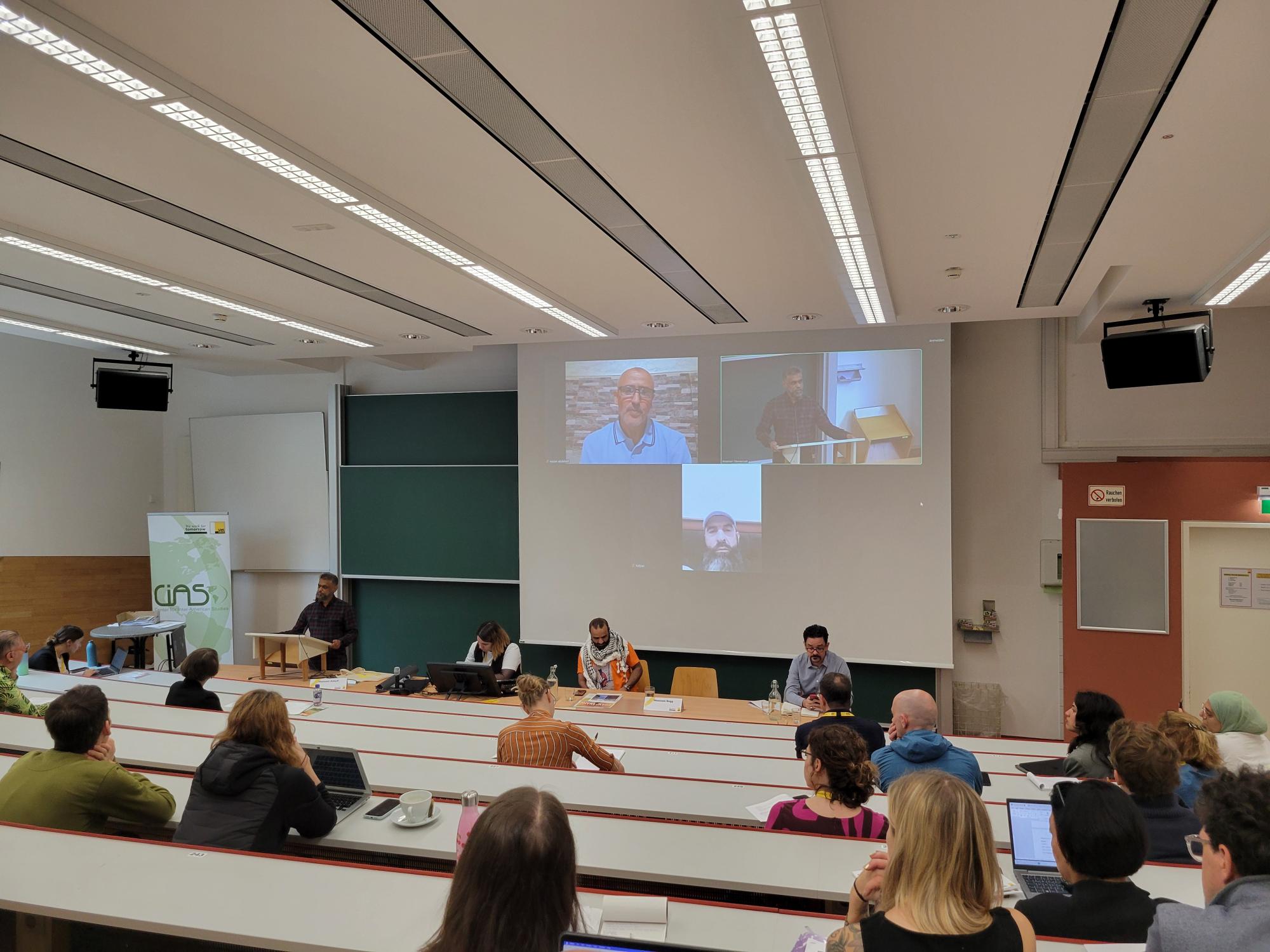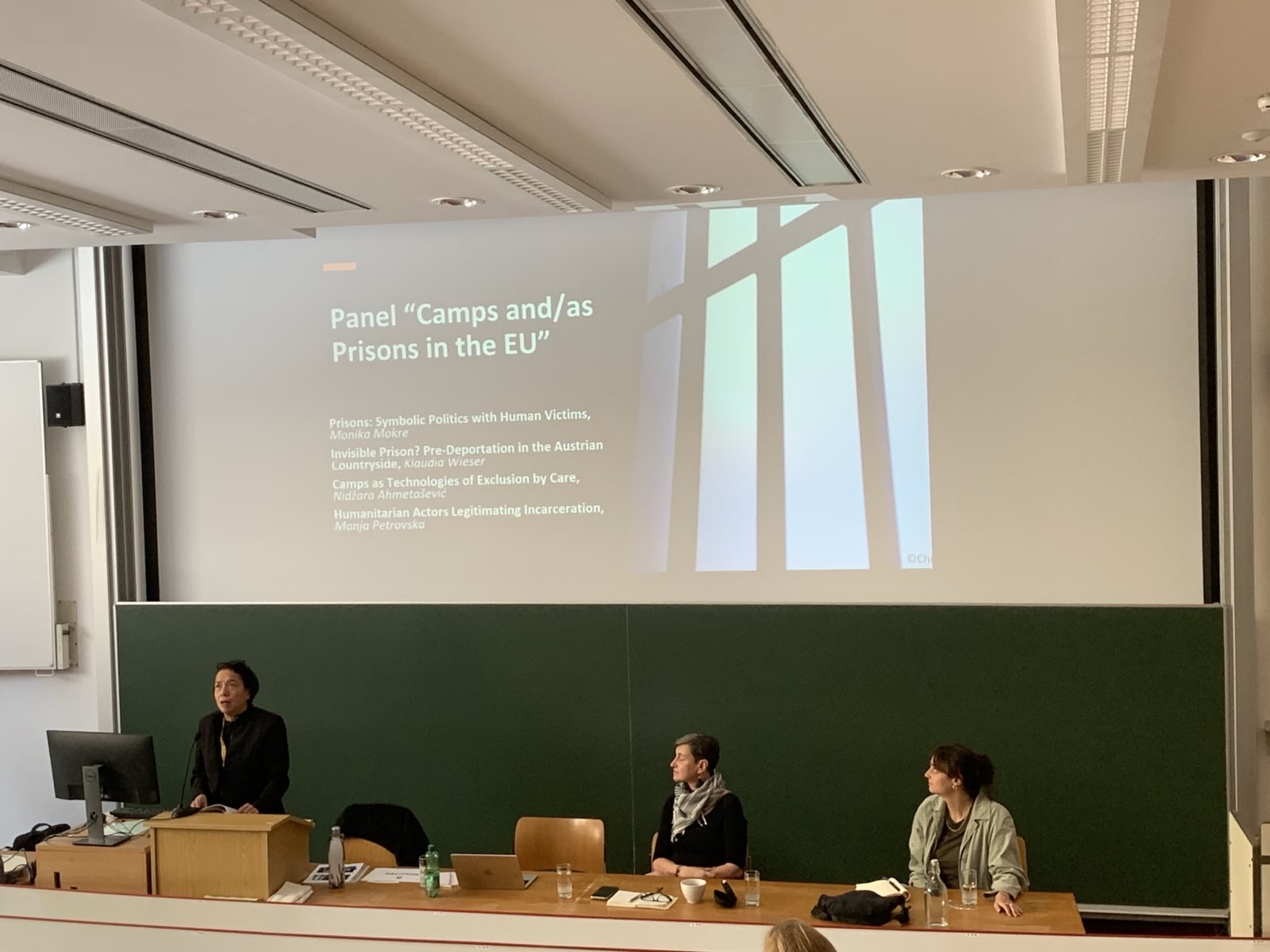Reflections from the 2nd Graz/Puerto Rico International Conference on Human Rights: Camps, Carceral Imaginaries, and Critical Interventions
A Fellow's impressions of the 2nd Graz/Puerto Rico International Conference on Human Rights from an Inter-American Perspective

Framing the Discussions
The 2nd Graz/Puerto Rico International Conference on Human Rights from an Inter-American Perspective, held from May 30th to June 2nd at the University of Graz, dealt with “Camps, Carceral Imaginaries, and Critical Interventions”. Thanks to the ACCS grant, we were able to organize a panel at this conference bringing together our reflections on current practices about people on the move as well as people in prison. These topics and their intrinsic relations and similarities also formed a core question for the whole conference bringing together scholars, activists, former detainees, and artists to discuss pressing issues surrounding camps, prisons, and detention centers. Especially enlightening for an analysis of the common functions of camps and prisons were the experiences and analyses of former Guantánamo prisoners. Their contributions played a pivotal role in transforming the conference into a space for deep reflection, learning, and the reimagining of a more just future.
Conference's short history and wider context
The first of this series of conferences, held in 2022, marked two decades since the establishment of the U.S. military prison at Guantánamo Bay. Often referred to simply as "Gitmo," Guantánamo Bay has a long and controversial history. The U.S. leased the Guantánamo Bay Naval Base from Cuba in 1903, and it has been in continuous use by the U.S. ever since, despite repeated demands from Cuba for its return. The detention camp at Guantánamo was established in 2002, as part of the U.S. "War on Terror. Over the years, Guantánamo has held a total of 780 detainees. As of 2023, about 30 detainees remain, many of whom have been cleared for release but continue to be held due to bureaucratic and political hurdles. The detention center remains a potent symbol of U.S. excesses in the name of national security, and efforts to close the facility have repeatedly stalled in the face of political opposition.
At the conference's opening, Mireille van Poppel, Vice-Rector of Internationalization at the University of Graz, and Roberta Maierhofer, a member of the Academic Board, welcomed participants, highlighting the privilege of being in Austria, where open discussion of important issues is encouraged. However, many attendees questioned these remarks, pointing out that over the past eleven months, Palestinians and their supporters have faced severe repression in Austria and across Europe. Throughout the conference, attendees drew critical parallels between Guantánamo Bay and the Israeli-led, U.S. and Western-backed genocide in Gaza. These connections were highlighted in various presentations, stressing that any discussion on prisons, incarceration, or refugee detention must also address the situation in Gaza. It was highlighted that the first person subjected to the torture unleashed by the U.S. state—was a Palestinian man described by The Guardian as a “human guinea pig in the CIA’s post-9/11 torture program”— Abu Zubaydah, also known as the "forever prisoner." he has been held in Guantánamo for 22 years without being charged with a crime or given any prospect of release.
The conference on May 30th coincided with a further erosion of human rights for Palestinians in Gaza. During the first 24 hours, Israeli warplanes and artillery targeted densely populated civilian areas in Gaza’s north, center, and south, resulting in numerous casualties. Concurrently, Israeli ground troops systematically demolished residential homes in the southern city of Rafah. Participants connected the genocide in Gaza to the broader theme of the conference, emphasizing the need for solidarity and action. Discussions highlighted how conditions in Gaza reflect a global pattern of using confinement as a tool of control and repression, underscoring the necessity for meaningful dialogue and intervention to address these injustices and others involving carcerality.
Expanding the Discussions
Building on the momentum from the inaugural conference in 2022, which focused on "Camps, (In)justices, and Solidarity in the Americas," this year's conference aimed to critically examine various forms of camps and enclosures, from the infamous Guantánamo Bay to other lesser-known sites of confinement. One significant topic of discussion was Australia's offshore detention centers, particularly those on Manus Island and Nauru. These centers have become notorious for their harsh conditions and the prolonged detention of asylum seekers.
Australia’s policy of offshore detention began in 2001 with the "Pacific Solution," which aimed to deter asylum seekers from reaching Australian shores by intercepting them at sea and transferring them to detention centers on Pacific islands. Manus Island, part of Papua New Guinea, and Nauru became the primary locations for these centers. Conditions in these centers have been widely condemned and described as torture. Reports from human rights organizations and journalists have detailed severe overcrowding, inadequate medical care, and widespread mental health issues among detainees. Many asylum seekers have spent years in these facilities, leading to significant psychological trauma. In some cases, detainees have resorted to self-harm and suicide in response to their hopeless situation.
The presence of Behrouz Boochani at the conference highlighted these issues. Behrouz, a Kurdish-Iranian journalist and asylum seeker, was detained on Manus Island for several years. His book, "No Friend but the Mountains," written via WhatsApp messages from within the detention center, provides a harrowing account of life in offshore detention. Boochani’s testimony added a crucial dimension to the conference, emphasizing the global nature of carceral practices and the shared struggles of detainees worldwide.
Boochani’s assertion during his keynote that "prisons learn from each other" became a central theme at the conference, sparking extensive discussions across various panels throughout the four days. This concept highlights how carceral practices and policies are not isolated phenomena but are instead part of a global network of ideas and strategies that influence each other. This interconnectedness means that innovations in one country’s carceral system can quickly be adopted and adapted by others. For instance, Boochani explained how Australia learned from Guantánamo with the establishment of Manus and Nauru, and now other states are learning from Manus and Nauru, as can be seen in the new offshore processing plans between Italy and Albania, or the UK and Rwanda.
The Panel Discussions
The conference sessions explored a diverse set of topics, from abolitionism and prison education projects to discussions on race, belonging, and borders. Key questions guided the discourse: How can we interconnect different carceral experiences to foster a comprehensive understanding of global detention practices? What new questions should steer discussions on carcerality?
Our panel, titled "Camps and/as Prisons in Europe," aimed to offer a comparative analysis of refugee camps and prisons, emphasizing their dual role in exclusion through detention while also noting their distinctions. We focused on the racist and classist underpinnings and the political-economic implications of these institutions. Each of our four panelists brought insights from both their research and activism across the Balkans, Austria, and Europe
 Monika Mokre (OEAW) initiated the panel by exploring the symbolic function of prisons, contending that they primarily serve as tools for social control rather than rehabilitation. She examined prisons' historical biases rooted in classism and their contemporary links to migration and racism. Her insights challenged attendees to reconsider the true role of these institutions in society. Klaudia Wieser (UW) then illuminated the hidden realities of a pre-deportation camp in Vordernberg, Austria. She contrasted the camp's official portrayal with the lived experiences of detainees, exposing the violence and isolation they endure within the EU. Nidžara Ahmetašević (Journalist; BzH) examined the restrictive and dehumanizing conditions in European refugee camps, drawing parallels with historical forms of confinement such as concentration camps. She critiqued the use of "care" to justify exclusion, advocating for a critical reassessment of the European refugee camp system. In conclusion, Marrija Petrovska (UvA & ULB) discussed the role of humanitarian actors in supporting the carceral aspects of state border regimes in the Balkans. She highlighted how various organizations work to finance camp structures and detention centers, implicating these actors in legitimizing incarceration. The analysis aimed to foster reflection on the ethical implications of humanitarian engagement in migration control.
Monika Mokre (OEAW) initiated the panel by exploring the symbolic function of prisons, contending that they primarily serve as tools for social control rather than rehabilitation. She examined prisons' historical biases rooted in classism and their contemporary links to migration and racism. Her insights challenged attendees to reconsider the true role of these institutions in society. Klaudia Wieser (UW) then illuminated the hidden realities of a pre-deportation camp in Vordernberg, Austria. She contrasted the camp's official portrayal with the lived experiences of detainees, exposing the violence and isolation they endure within the EU. Nidžara Ahmetašević (Journalist; BzH) examined the restrictive and dehumanizing conditions in European refugee camps, drawing parallels with historical forms of confinement such as concentration camps. She critiqued the use of "care" to justify exclusion, advocating for a critical reassessment of the European refugee camp system. In conclusion, Marrija Petrovska (UvA & ULB) discussed the role of humanitarian actors in supporting the carceral aspects of state border regimes in the Balkans. She highlighted how various organizations work to finance camp structures and detention centers, implicating these actors in legitimizing incarceration. The analysis aimed to foster reflection on the ethical implications of humanitarian engagement in migration control.
Our panel underscored the urgent need to address the interconnected issues of incarceration and migration. During the closing Q&A session, participants engaged in a dialogue, questioning the complicity of various institutions in perpetuating these systems of oppression. The discussion emphasized that these issues are not isolated but are part of a broader pattern of state-sponsored violence aimed at exclusion and control.
Closing Remarks
The conference concluded on a positive note, with both organizers and participants reflecting on the rich diversity of perspectives, the depth of the discussions, and the active engagement of attendees, all of which contributed to a dynamic exchange of ideas. The event successfully fostered critical reflections on the global dimensions of carcerality and underscored the urgent need for solidarity in addressing these issues. What distinguished this conference was not only its academic success but also its strong call to action, reminding us that our work must extend beyond the walls of the university.
